13/05/2015 |
Comments:
0 |
Posted by: Eric van der Westen |
In:
Blog, Stories
My Sezen Aksu story
Istanbul 9-5-2015
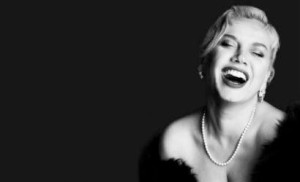
Sezen Aksu; The Grand Dame Of Turkish Pop
It’s after another corporate concert in Izmir that percussionists Jarrod Cagwin, Mustafa Boztuy and myself hang out in Zebik, a small but good local restaurant in Beyoglu Istanbul after the 2nd public concert was cancelled due to reasons you can only expect to happen in Turkye. Things in Turkye don’t always happen along understandable lines…. We’re tired because of the lack of sleep which always hunts us in circumstances like these. But in Beyoglu sleeping is not possible before 4 a.m. So we surrender to the flow of this eye of the hurricane.
Beyoglu is an extremely busy and noisy old neighborhood in the European Part of Istanbul. The city quarter is filled with restaurants and all sorts of hotels and is everything you’d imagine a busy oriental metropolis would be: it’s dirty, smelly, joyful, loud, beautiful and very vibrant all at the same time. It’s most famous avenue is called Istiklal on which an old tram rides up and down the slope to either Tunel or Taksim Square. The area used to be a mix of cultures and resembles the time when the Ottoman Empire had more cultural diversity in its capital than it does now. It must have been a vibrant area when Jews, Greeks, Armenians, Western Europeans, Americans, Arabs and many more from all different places, tried to make it their home. Traces of eviction are still apparent in the old 20th century buildings that have deteriorated since they were abandoned. Nobody knows who’s the owner and nobody cares; leaving the once aesthetic buildings turn to ruins.
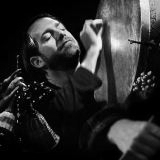
Percussionist Jarrod Cagwin
Jarrod, Mustafa and myself are part of the rhythm section of Sezen Aksu’s Acoustic Band and have become good friends which happens if you share so many ups and downs while working as a team with one of the most exceptional stars of Turkish music. Having said that it’s obvious that many of you may never have heard of her just as I did when I was invited to come to Istanbul for the 1st time . How did I get to play with this Turkish phenomena? As a musician I always had a big taste for African music. Especially South Africa was a country that since I was a kid had been of great interest to me. I think it started when I was in primary school where I learned old “boere” songs like “Sarie Marais” which sound I embraced. Little did I know about the despicable political system in which the majority of the SA people suffered until I was about 13. The Soweto uprising in 1976 showed the disgraceful character of the Apartheid regime and my political awareness arose with me witnessing that on TV. There was no excuse for shooting children my age who wanted to learn English instead of Afrikaans. I became a supporter of the anti-apartheid movement in Holland. And since I sincerely believe that music is a great tool in spreading political awareness, South Africa became even more a focus. And by the time I started to study jazz I got to know Abdullah Ibrahim or Dollar Brand as he was called earlier. What a treat his music was and is: blues, jazz, larded with happiness and joy of life. Of course he became one of my heroes and the seeds planted by my early attempts to sing a song in school were transformed into a music style that I can truly call my own. I loved the melancholy of the African melodies and the chord structures which accompanied them: I used them and transformed them and became a bit of an expert on African music. At least that was the way the critics and audience conceived it. For myself I quickly realized that my roots were so different that I could only comprehend parts of it. In all collaborations with African musicians I’ve tried to do what I do best: make my own brand of music. Like the answer my ultimate jazz hero Charles Mingus replied to the question:” what kind of music are you making? Mingus Music! What else? That became a thought for me to hold on to. And so I kept taking influences I liked into my music. Being eclectic handed me the right tools to find my own voice – the most important element in music- and become more and more interested in different cultures and use whatever I liked. I bought many records from Peter Gabriel Real World label that opened my ears to new things time and time again. Remy Ongala, Ayub Ogada, the drummers of Burundi, Cecile Keyirebwa, Ali Fatih Kahn, a.m.
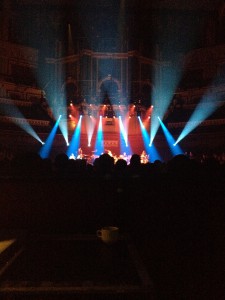
Sezen Aksu Acoustic Band Royal Albert Hall London
So slowly word got around that this bass player who grew up in Tilburg West had a liking for many different tastes and after having spent the latter of the 90’s playing and touring Africa and Europe was a force that was reliable and professional.
Then the call came that changed my life. It really did…. Are you interested in a project concerning traditional Ottoman music? Being opportunistic as any professional musician must be, I answered: sure? OK, what do you charge per concert? I was taken by surprise since it was not the usual way to immediately talk money. I named my price and the other voice said ” fine” which meant that I could have asked much more…. Cursing myself we agreed to do it and they would get me all the music and notes and shit in time. Click and silence…..Jeezz! I said to myself: get a grip man! Next time negotiate properly and be prepared! Then time passed and I heard….nothing. It took time and I was about to accept other gigs for the dates reserved when I received a package with audio material and notes. As I opened it, I realized I was getting into something that was way beyond anything I had ever done. First of all: the notes were wrong: the sharps and flats were turned around sometimes as if someone had never ever written proper signs in music. But other were correct! Hmmmm. I put on the music and started to look at the music charts with the audio material. And then it occurred to me what it was. This was micro tonal music. I had ( and have – as every double bass player-) a problem playing in tune on a Double Bass and worked hard to find the right notes on the fingerboard. You may know that a Double Bass has no frets like a guitar or bass guitar. And now they want me to play music that is actually in tune when it’s out of tune! This was something else! For the first time in my musical life I really doubted whether I could do this. But time was short and rehearsals and concerts were in two weeks. So I did what I always do when it comes to it: I put in all my effort to play up to the level I expect for myself. In saying that, I can truly say that there is no greater critic about myself than me. I have burned myself down more often than people have lit a cigarette. So I studied and studied frantically. And I mastered the material. It had a connection to the East African music I was into lately. The old Anatolian music was hard and very difficult to play but I managed.
I met cellist Ugur Isik and the Farkin brothers, who are percussionists, in Amsterdam for the rehearsals and first concert in the Tropen theater which unfortunately has vanished from budget cuts of our dear highly overrated government. We played the concert and I was relieved I didn’t fuck up too much. The micro tonality was everywhere and I followed Ugur in every step he took. I was like an eagle spotting his prey. They were the gentlest of people and after a week said they music wouldn’t sound right when I wouldn’t be there anymore back in Turkye. It was a complement of a lifetime. Luckily I had received a few more in the passing of time, but this one was really special.
After the concert in the Zuiderpershuis in Antwerp we split up and wished all of us goodbye. That was it. I thought…….
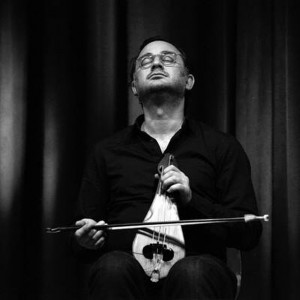
Kemence Master Derya Türkan
Then a year later I got a call from the same guy that had offered me the Ugur job. And now I was prepared. He said can you please do concerts with Derya Türkan and Ugur Isik. Yes, I replied again and after we’d cut the deal I was happy. Riza Okcu and his brother Alp who started the agency StageArt have become the dearest of friends since that first collaboration. Then the music charts came again…..all Arco ( bowed) bass parts but no micro tonality this time. Peshrevas and other music from the rich Turkish Medieval music history. Our first concert was in the Concertgebouw Amsterdam. I met Derya and immediately knew I had met a very special person. The gentle but strong man mastered the music like I’ve never seen anyone do before. He played seemingly effortless and enjoyed every second of it. It was utterly beautiful music and it was one of the most special moments of my musical career. I was more courageous, feeling more at home with the type of music and confident enough because I had mastered the prior Turkish music task. So I took solo space when possible and played introductions to pieces and we all had a great time. Had I known I had to replace Renaud Garcia Fons in a trio in advance I’d probably wet my pants!!! They hadn’t said that!!!!! Very few bass players are so intimidating as him. Without a doubt one of the most virtuosos on the instrument and simply a great master. He’s the Messi of double bassists so to speak-though a bit older. But luckily I didn’t know…..so I embedded in the music and even now remember many details of what we’ve played that evening.
The next thing is that I got a call from Riza asking would you want to play with Sezen Aksu? With my previous experiences and new self-confidence I naturally answered positive again and then there was the silence for about half a year. Nothing. No email, no call. I even didn’t know who she was as I hadn’t really gotten her name properly. As Riza had called me, I misheard and thought it was Sezen Okcu, probably his wife- I thought. I didn’t check anything because as usual I was running around playing and working as hard and much as I could. As jazz musicians do I’d do it on the spot when it would come down to it.
Then I got the call. Could you be in Istanbul in February? Sure? And are you available in March to tour Europe and the US? Surprised as I was I got on the plain- no we’ll supply a double bass for you here: you don’t have to bring your own! I went to Istanbul for the first time and got picked up by Riza at the airport and drove me to the Asian side of Istanbul which to me looked like the equivalent of a beehive. He treated me, knowing I like good food, on a delicious meal and brought me to the hotel. It was nothing what I ever had expected. With Jasper van ’t Hof I had had nice, mostly good middleclass hotels but this was a different ballgame. A wellness and medical five star hotel residence with a room that was as large as my whole house in Holland. What time is the rehearsal, I said. Are there charts available for me to practice? Relax! This is Turkye! Riza replied: tomorrow we’ll start at 18.00 and the music is not complicated. You’ll get everything there. Your transport will be here at 17.00 so now relax and enjoy the Turkish hospitality. He didn’t need to tell me twice of course….I embraced the luxurious surroundings.
So I headed of to the rehearsal with Mustafa and Jarrod who were in the same hotel and to whom I got introduced to. We got into rehearsals and there I got to meet the other members of the Acoustic Band: Fahir Atakoglu, Özer Arkun, Fatih Ahiskali, Göksun Cavdar and Nurcan Eren whose names I couldn’t remember in the first place, which is a whole different story. I didn’t speak a word of Turkish yet. But that’s how I got to play in Sezen’s band though I wouldn’t see Sezen for a couple of days yet. It was as if I had landed on a different planet.
Read more →
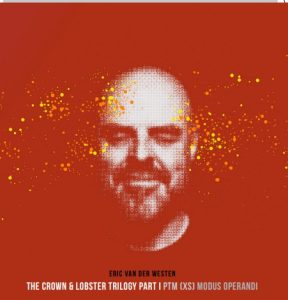
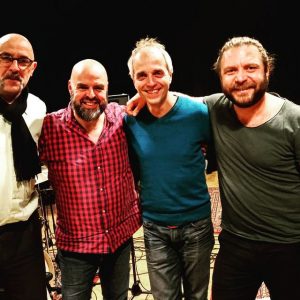

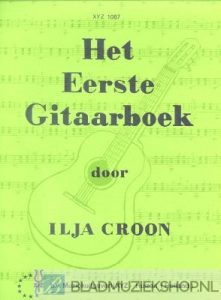 I worked my way through Ilja Croon’s Guitar method book 1 and 2 and when I had learned the barre chords I was ready to try everything on my own. I must have been about 13 years old when I played with my friends Ad Ghering -a hockey-playing-drummer whose father was an (upright) jazz bass player where I first saw a real huge impressive double bass- and Rene Samuels the guitarist that I met when I had my first guitar lessons with Peter van de Par who’d become a successful antique trader later. My first electric guitar was an Eco semi acoustic that I bought from Peter. It had a huge feedback and was a nice, easy to play guitar. But It was my Rokkoman Les Paul copy that I would play on for some time. It didn’t take long before I’d switch to bass guitar and bought myself a Hondo Precision Bass
I worked my way through Ilja Croon’s Guitar method book 1 and 2 and when I had learned the barre chords I was ready to try everything on my own. I must have been about 13 years old when I played with my friends Ad Ghering -a hockey-playing-drummer whose father was an (upright) jazz bass player where I first saw a real huge impressive double bass- and Rene Samuels the guitarist that I met when I had my first guitar lessons with Peter van de Par who’d become a successful antique trader later. My first electric guitar was an Eco semi acoustic that I bought from Peter. It had a huge feedback and was a nice, easy to play guitar. But It was my Rokkoman Les Paul copy that I would play on for some time. It didn’t take long before I’d switch to bass guitar and bought myself a Hondo Precision Bass 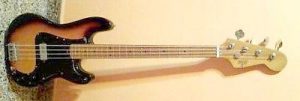 and an Ibanez Cube Amp. In our local music shop “Bill Coolen” I’d spend hours and hours just looking at the most fabulous basses and guitars that were way out of my league. Especially real Fender Precisions or Rickenbackers
and an Ibanez Cube Amp. In our local music shop “Bill Coolen” I’d spend hours and hours just looking at the most fabulous basses and guitars that were way out of my league. Especially real Fender Precisions or Rickenbackers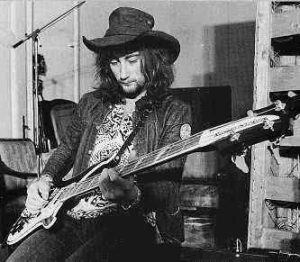 like the one my hero Roger Glover in Deep Purple used to play like a wet dream. In fact they still are: an old ’62 Precision or a good old Rickenbacker are still worth a fortune.
like the one my hero Roger Glover in Deep Purple used to play like a wet dream. In fact they still are: an old ’62 Precision or a good old Rickenbacker are still worth a fortune.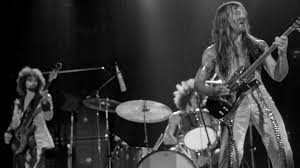 and “All Right Now from Free”…that stuff beside some originals. One of the first songs I wrote was “Never Coming Home”, on which I played harmonica as well, slightly based on “Heroin” by Lou Reed from “Rock ‘N Roll Animal”. “Babi Yar”was another original song inspired by “Hard Lovin’ Man” from Deep Purple about a massacre of the Jews in WW2;I was way too serious those days….
and “All Right Now from Free”…that stuff beside some originals. One of the first songs I wrote was “Never Coming Home”, on which I played harmonica as well, slightly based on “Heroin” by Lou Reed from “Rock ‘N Roll Animal”. “Babi Yar”was another original song inspired by “Hard Lovin’ Man” from Deep Purple about a massacre of the Jews in WW2;I was way too serious those days….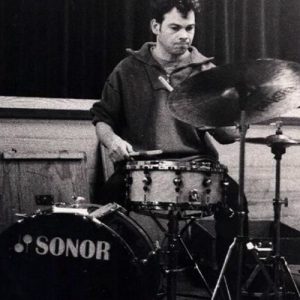 Rene Wouters played the guitar and we were a real band for about 5 years. We started of rehearsing on Friday afternoon at our former primary school. Later on we rehearsed in the attic of a barn of Ronald’s farm. We build a room of blocks of hay to isolate both for sound but also for temperature. Of course all in vain…. In summer it would be extremely hot and in winter there was no way to heat anything up but coffee and booze, but at least we wouldn’t have to carry our gear in and out the room every time. I remember we’d go to some ponds at night after rehearsal and have a great time. I taught a good friend Ben Doomen how to play functional organ in an old chapel- de Hasseltse Kapel- in Tilburg, opposite his home. We had a vocalist Robert Sauvé, who had a lot of nerve, not such a great voice though, and had an excellent sense of humor. They came and went.
Rene Wouters played the guitar and we were a real band for about 5 years. We started of rehearsing on Friday afternoon at our former primary school. Later on we rehearsed in the attic of a barn of Ronald’s farm. We build a room of blocks of hay to isolate both for sound but also for temperature. Of course all in vain…. In summer it would be extremely hot and in winter there was no way to heat anything up but coffee and booze, but at least we wouldn’t have to carry our gear in and out the room every time. I remember we’d go to some ponds at night after rehearsal and have a great time. I taught a good friend Ben Doomen how to play functional organ in an old chapel- de Hasseltse Kapel- in Tilburg, opposite his home. We had a vocalist Robert Sauvé, who had a lot of nerve, not such a great voice though, and had an excellent sense of humor. They came and went.  We eventually added a guitarist Ashna Vishnudat who was a real virtuoso to our standards. He loved Al DiMeola and that jazz rock stuff that was extremely popular with musicians in the late 70’s, and could play like that too. My eclectic spirit didn’t help to find a musical course though…. We tried several musical styles; Deep Purple and Rainbow like hard rock (Axe) , U2 and Joy Division type new wave (Transmitted Tears) etc. to get even a bit of success but it wasn’t really happening in the end. We played some loud and nice gigs but never enough to get a working band ethic that I longed for so much. To this day I regret that we didn’t play more gigs back then to really get the hang of touring in a Rock And Roll Band. I’m always looking for a working band atmosphere; I still do. My efforts to enroll Conservatory put an abrupt end to my band efforts in contemporary pop music. I had the idea that I couldn’t continue in the same way and had to start to go my own way though I had no clue in what I was doing. Instead of focusing on a band effort I took a shot at diving in a new music genre that soon would completely change my musical environment.
We eventually added a guitarist Ashna Vishnudat who was a real virtuoso to our standards. He loved Al DiMeola and that jazz rock stuff that was extremely popular with musicians in the late 70’s, and could play like that too. My eclectic spirit didn’t help to find a musical course though…. We tried several musical styles; Deep Purple and Rainbow like hard rock (Axe) , U2 and Joy Division type new wave (Transmitted Tears) etc. to get even a bit of success but it wasn’t really happening in the end. We played some loud and nice gigs but never enough to get a working band ethic that I longed for so much. To this day I regret that we didn’t play more gigs back then to really get the hang of touring in a Rock And Roll Band. I’m always looking for a working band atmosphere; I still do. My efforts to enroll Conservatory put an abrupt end to my band efforts in contemporary pop music. I had the idea that I couldn’t continue in the same way and had to start to go my own way though I had no clue in what I was doing. Instead of focusing on a band effort I took a shot at diving in a new music genre that soon would completely change my musical environment.


